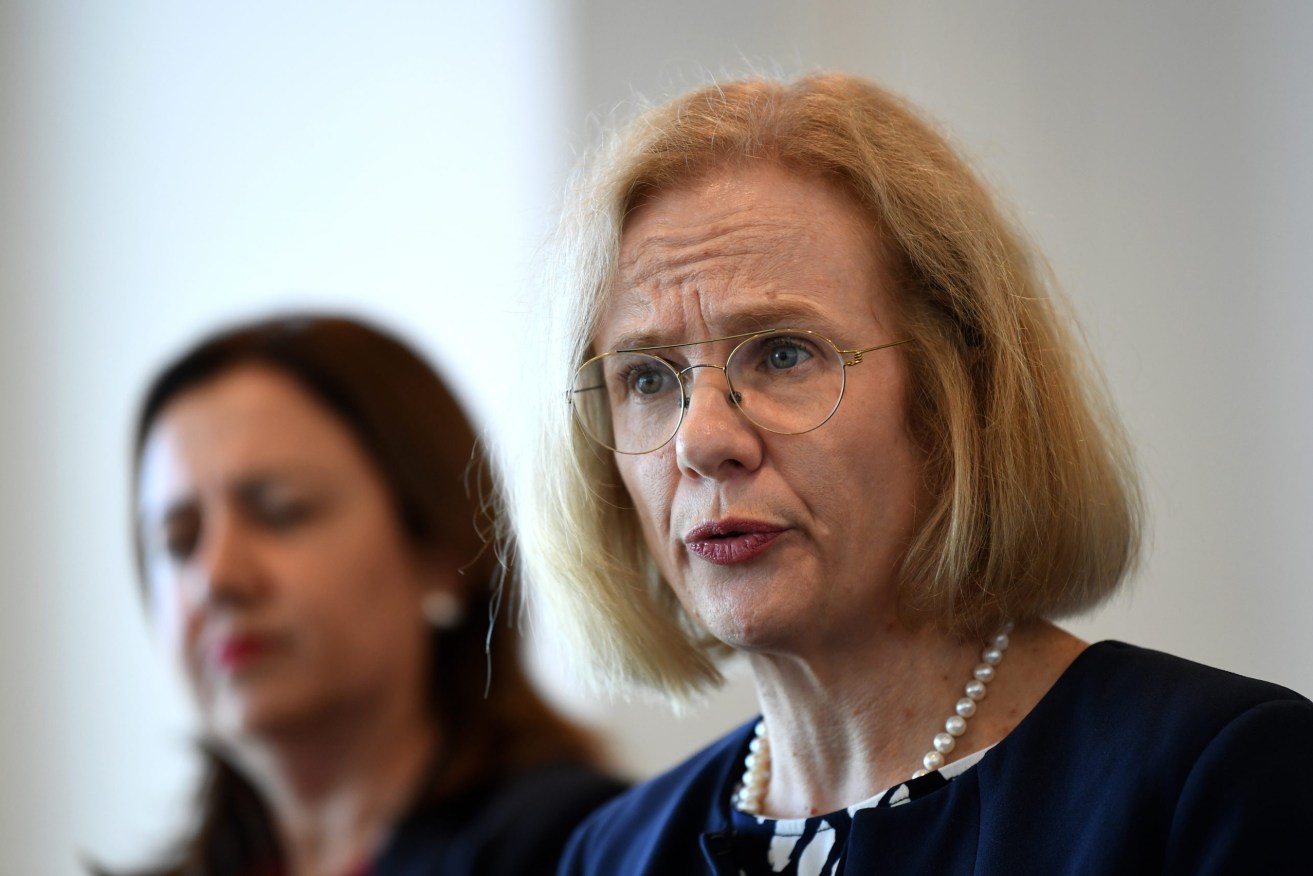Prepare for the worst: Extraordinary powers granted to Qld health chief
Tough new powers given to the state’s Chief Health Officer have raised fears of targeted shutdowns, cast doubts over elections and brought the ire of civil libertarians.

Queensland Chief Health Officer Dr Jeannette Young (right), with Premier Annastacia Palaszczuk. (Photo: AAP Image/Dan Peled)
As Queensland prepares for the worst, pubs and clubs have sought urgent advice on the new coronavirus restrictions and told venue managers that more than 100 patrons may still be allowed under certain circumstances. But managers have been urged to comply with any instructions under threat of total closure.
Following a national Cabinet meeting, Prime Minister Scott Morrison and Queensland Premier Annastacia Palaszczuk yesterday announced the ban on gatherings of 500 people or more would remain for outdoor events, however for indoor events the threshold would be lowered to 100.
The restrictions – separate to largely voluntary self-distancing measures – do not apply to essential gatherings including those at shopping centres, supermarkets, office buildings, public transport, factories and mine sites, however this may change.
With Australia moving into an era of extended physical isolation, Morrison said the states would refine the rules for indoor venues this week. On Wednesday night, State Parliament passed new laws giving Chief Health Officer Jeannette Young additional powers, that Palaszczuk said would allow her to “act swiftly”.
“If we do not act now to contain the spread of this virus it will spread rapidly through our communities with devastating impacts,” Palaszczuk told parliament.
Young, who has already overseen home quarantine arrangements, will have the power to act unilaterally and even postpone the council elections and by-elections scheduled for March 28, possibly even the state election seven months later.
Queensland Council for Civil Liberties president Michael Cope said the late-night laws also allowed for parliament itself to be shut down, potentially limiting transparency and accountability in a time of crisis.
“One of the strengths of a pluralistic society is that open debate and criticism of the government can prevent the government from making bad decisions or change the course of bad decisions,’’ Cope said.
Nationally, there are restrictions on supermarket purchases and now also pharmacy dispensing, to prevent so-called ‘panic buying,’ and supply chains have been disrupted by global travel restrictions. Essential services have been safeguarded and Queensland energy companies have promised not to disconnect anyone late paying their bill.
Queensland liquor licensing and health officials have already held talks with industry groups representing thousands of pubs and clubs, who, at least for the time being, are working off a definition that each enclosed area of a venue can hold up to 100 people including staff. For example, a pub might have separate bars, function rooms and a restaurant, all of which are being treated separately, while beer gardens and rooftop bars are being treated as outdoor venues subject to the 500 people threshold.
Clubs Queensland has advised managers on the process for standing down staff, or telling them no more hours are available, and urged venues to follow the rules in hope it will avoid the need for tougher restrictions or a complete shutdown.
On ABC radio this morning, Clubs Queensland CEO Doug Flockhart conceded everything was a “work in progress” but they had staff and loyal patrons to think of – including, whether venues will still be operating once the worst of the pandemic has passed.
“If the community doesn’t support venues, including our community clubs, noting that we’re going to have all the distancing criteria in place and over the top hygiene practices etcetera, there will be significant casualties,” Flockhart said.
“On that basis, we’re talking currently to local governments across Queensland, state government, the federal government, in terms of what they may well be able to do to help us.”
The Queensland Hotels Association has advised managers to recommend social distancing of 1.5 metres, limit density in smaller bars, reduce operations in gaming rooms and limit live entertainment that might encourage closer contact.
Across Australia, concerts, music festivals, theatre performances, conferences and other events are being cancelled, adding to the impact on the hospitality and tourism sectors. It may take months to ascertain the economic implications.
According to the QHA, normal “move through” traffic within a venue will not be counted towards the limit, however all changes need to be scalable.
“For example, if the number for indoor gatherings is reduced to five (5), we need to ensure that accommodation hotels can check in and check out guests, whilst at all times encouraging social distancing,” the QHA has advised.
The Gold Coast casino has closed its theatre and buffet, and, along with the Brisbane casino also operated by Star, will deactivate every second gaming machine and electronic table game to distance patrons.
The State Government makes significant revenue out of pubs, clubs and casinos, particularly from gaming machine taxes.












